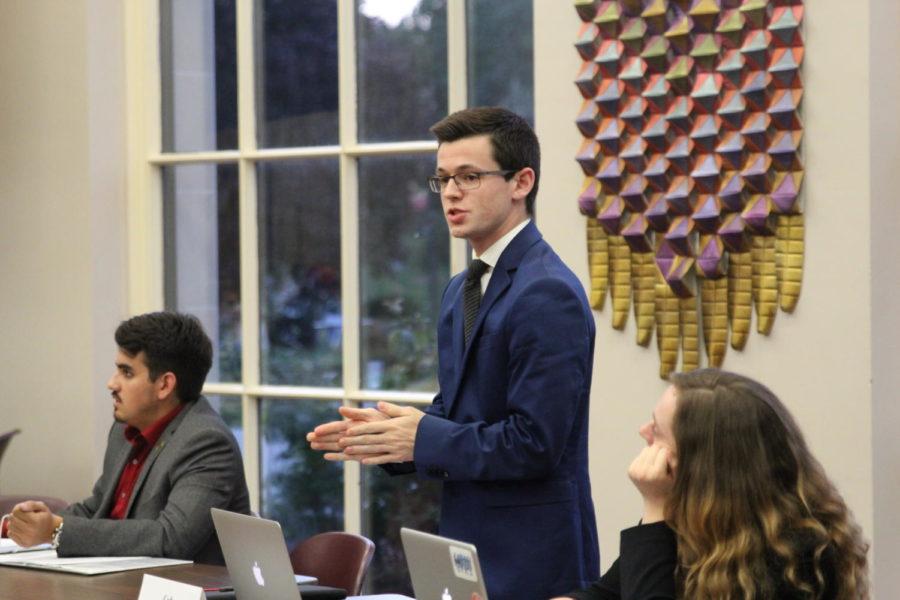Student Government addresses trademark policy with new resolution
Speaker Cody Woodruff touches on concerns with the resolution denouncing Iowa State University’s Trademark Policy at the Student Government meeting on Aug. 30.
October 2, 2018
Student Government has drafted a new resolution in regards to the updated trademark policy.
The resolution asks for a delay in policy implementation, as well as other requests to improve the communication between students and administration.
Iowa State updated their trademark policy in June to create stricter policies on the use of Iowa State University’s identifying marks, such as the words, names, symbols and designs that are directly associated with the university.
“Although a desire to associate with the university may come from a genuine spirit of support, it is in the university’s best interest to protect and control the use of the Marks,” according to the trademark policy.
According to the official policy, there are five main purposes to the new update. It aims to protect the university by establishing a consistent use of identifying marks, help fulfill their legal obligation to protect their identifying marks, protect consumers from inferior or deceptive products bearing the marks, allowing a fair treatment of all license holders, and to distribute royalties earned from the licensing to the benefit of the university.
Student organizations were given until late August to make the appropriate alterations to their names and logos. According to a presentation given by Mike Norton to the Senate on Sept. 19 meeting, all 167 clubs and organizations affected had either complied with the new policy or were working with the university to make changes.
However, some leaders of student organizations have expressed disappointment in the implementation of the new policy. The Senate proposed and will be voting on a new resolution to address these concerns in the next two weeks.
Speaker of the Senate Cody Woodruff said the most upsetting part of the new trademark policy was the timing.
“The due date for the change, from when the new policy was implemented to when the student organizations were supposed to have these changes implemented, was around August 27 or 28, which is just over a week after classes started,” Woodruff said. “That did not leave much wiggle room at all for student organizations to adapt to new changes.”
If a student organization did not comply with the new policy in time, the organization would not be able to participate in ClubFest, which is a huge recruitment event for a majority of the student organizations.
“In general, we think that the policy is too stringent. Its forcing a lot of organizations that have been on campus for a long time to change when we don’t think it is maybe necessary, especially if they haven’t been the ones to violate any policies,” Woodruff said.
The Senate has written a new resolution they hope to propose to the Trademark Licensing Office, the University Counsel and President Wintersteen.
The resolution asks for the temporary halt of the policy’s implementation until the end of the semester to build better communication and allow student organizations more time to fully adapt.
The Senate also asks the administration to consider grandfathering in student organizations that have been active on Iowa State’s campus for 10 or more years and are in good standing with the university. This would allow those organizations to retain their previous names and logos.
Many long-standing organizations are recognizable nationwide by their current name, and the Senate would like for them to at least be less affected by this policy.
“PrISUm comes to mind, that’s another example we have talked about a lot in these meetings, too, because they are kind of a unique case,” Woodruff said. “They have most definitely, no one has argued, raised the university’s profile which is huge for Iowa State. They have done a lot of good work but we don’t want them to change their name because its what they are known for, but unfortunately it looks like they might have to.”
The Senate wants to see more student representation on the Trademark Advisory Committee (TAC), with many representatives from other student organizations as well as Student Government. Currently, there is only one student member serving on the TAC.
Finally, the resolution asks the administration to provide the Senate with all documentation and communications regarding the policy change and why the policy change was made.
“I am hoping to see a fuller and clearer picture of the truth,” Woodruff said.
Woodruff has spoken with members of the administration as well as current and former members of the Senate, and said he has found some discrepancies in the reasoning behind the policy change. Woodruff said it is the duty of the Senate to look over these documents and communications to establish what the true purpose was.
Woodruff said this bill is not meant to be antagonistic, but it is a chance for the students and the administration to work together and show that they are a team.
“We don’t want this to be necessarily antagonistic towards the university administration,” Woodruff said. “It’s very important we keep a strong relationship with them, and many, many wonderful officials are amazing at working with Student Government and have been for as long as I have been here and as long as they have been here.”
The Senate’s new resolution will be read into the Senate this Wednesday and the Senate will be voting on the resolution at their meeting on Oct. 10.







